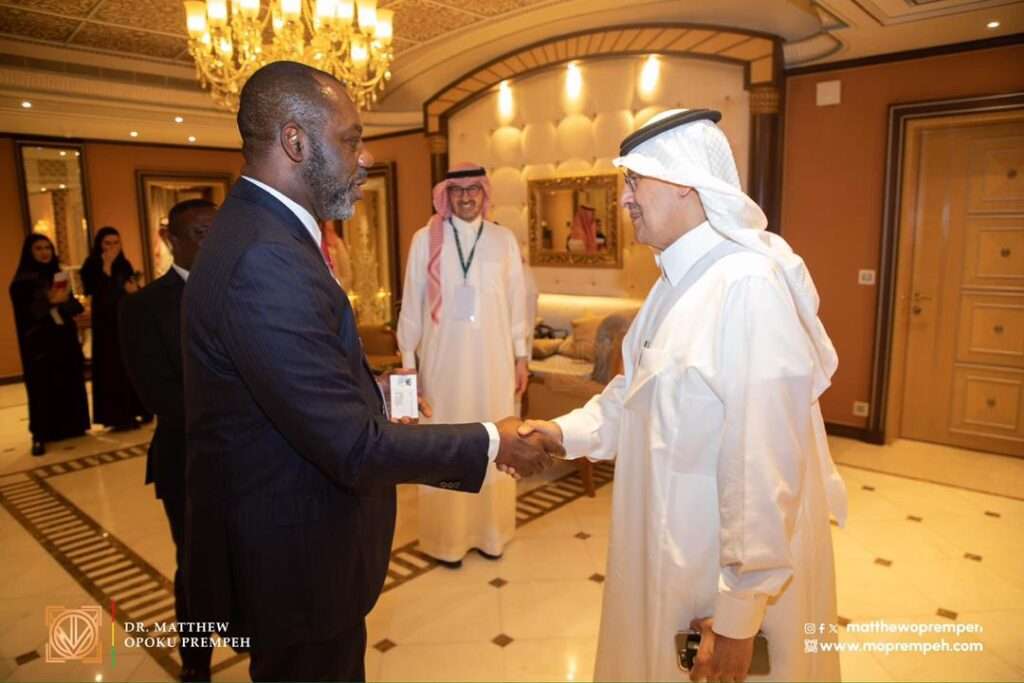In a bid to achieve sustainable growth and bolster its energy sector, the Republic of Ghana has embarked on a mission to forge strategic partnerships with global powerhouses, including the Kingdom of Saudi Arabia. The West African nation aims to leverage the expertise, resources, and investments of these energy giants to meet its growing energy demands and foster long-term sustainable development.
Ghana, known for its stable democracy and burgeoning economy, has made remarkable progress in recent years. However, the country still faces significant challenges in meeting its increasing energy needs and reducing its reliance on traditional fossil fuels. Endowed with significant natural resources including oil, gas, and renewable energy potential, Ghana has long recognized the importance of developing a robust energy sector to drive economic progress. Recent efforts have focused on diversifying its energy mix, promoting renewable sources, and attracting foreign investment to support infrastructure development.
“I met His Royal Highness Abdulaziz bin Salman bin Abdulaziz, Minister for Energy of the Kingdom of Saudi Arabia, at whose invitation I participated in the World Economic Forum’s Special Meeting in Riyadh, the Kingdom of Saudi Arabia. The Forum was on the theme ‘Global Collaboration, Growth and Energy for Development.
We held discussions on potential collaboration in the energy sectors of our respective countries in broader areas – Oil for Sustainability Programme, clean cooking initiatives as well as same within the power sector value chain.”
Dr. Matthew Opoku Prempeh, Ghana’s Minister of Energy
Recognizing the potential for collaboration with global energy leaders, Ghana is actively seeking partnerships to accelerate its energy development initiatives. The latest initiative sees Ghana engaging with Saudi Arabia, a global leader in oil production and a key player in the energy market.
Discussions between the two nations have centered on potential investment opportunities, technology transfers, and knowledge sharing to optimize Ghana’s energy resources. Saudi Arabia’s expertise in oil and gas extraction, coupled with Ghana’s burgeoning renewable energy sector, presents opportunities for mutual benefit and sustainable development.
Promising Benefits from Global Partnership

The partnership between Ghana and Saudi Arabia holds the promise of several significant benefits. It will facilitate knowledge and technology transfer, enabling Ghana to harness the latest advancements in renewable energy. This transfer of expertise will support the development of domestic capabilities, fostering job creation and skills enhancement within the Ghanaian workforce.
Additionally, the collaboration will attract substantial investments, allowing Ghana to upgrade its energy infrastructure, expand its power generation capacity, and enhance grid reliability. These improvements will not only meet the country’s growing energy demands but also provide a solid foundation for future economic growth and industrial expansion.
Furthermore, the partnership will contribute to Ghana’s commitment to combating climate change and reducing greenhouse gas emissions. By embracing cleaner energy sources, the country will make significant strides toward achieving its climate goals while setting an example for other nations in the region.
Ghana’s Minister of Energy, Dr. Matthew Opoku Prempeh, expressed optimism about the potential collaboration, stating, “Partnering with global giants like Saudi Arabia will accelerate our journey towards sustainable growth and energy security. We are committed to creating an enabling environment for investments and technology transfers that will transform our energy sector.”
Ghana’s pursuit of partnerships extends beyond Saudi Arabia, with the country actively engaging with other global energy giants to drive progress in its energy sector. Notably, collaborations with companies from countries such as China, the United States, and European nations have yielded significant results.
China, a longstanding partner in Ghana’s energy sector, has been involved in various projects aimed at expanding electricity generation capacity and improving transmission infrastructure. Chinese investments have contributed to the development of hydroelectric dams, solar farms, and thermal power plants, enhancing Ghana’s energy security and supporting economic growth.
Meanwhile, partnerships with American energy firms have focused on enhancing oil and gas exploration and production capabilities. Ghana’s offshore oil reserves have attracted investments from major U.S. companies, leading to the development of offshore fields and the expansion of the country’s petroleum industry.
European nations have also played a vital role in Ghana’s energy landscape, particularly in the promotion of renewable energy technologies. Collaborations with European companies have facilitated the deployment of wind farms, solar installations, and biomass projects, aligning with Ghana’s commitment to sustainable energy development and climate change mitigation.
The progress made with these partners underscores Ghana’s proactive approach to addressing its energy challenges and advancing its development agenda. By forging strategic alliances with global energy giants, Ghana aims to build a resilient and diversified energy sector that can meet the growing demands of its economy while promoting environmental sustainability.
As discussions with Saudi Arabia and other potential partners continue, Ghana remains steadfast in its commitment to leveraging international expertise and resources for the benefit of its citizens and the broader region. With sustainable energy development as a cornerstone of its agenda, Ghana is poised to chart a path toward long-term prosperity and resilience in the face of evolving energy dynamics.
READ ALSO: Exxon Misses on Q1 Profit Despite Growth in Guyana Operations























